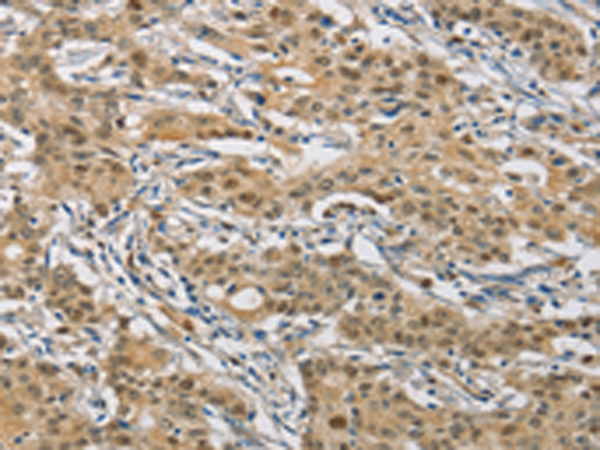


| WB | 咨询技术 | Human,Mouse,Rat |
| IF | 咨询技术 | Human,Mouse,Rat |
| IHC | 1/50-1/200 | Human,Mouse,Rat |
| ICC | 技术咨询 | Human,Mouse,Rat |
| FCM | 咨询技术 | Human,Mouse,Rat |
| Elisa | 1/1000-1/5000 | Human,Mouse,Rat |
| Aliases | KAP; Kdap; NAP1; NAPA; SNAPA |
| WB Predicted band size | 45 kDa |
| Host/Isotype | Rabbit IgG |
| Antibody Type | Primary antibody |
| Storage | Store at 4°C short term. Aliquot and store at -20°C long term. Avoid freeze/thaw cycles. |
| Species Reactivity | Human, Mouse |
| Immunogen | Fusion protein of human NAPSA |
| Formulation | Purified antibody in PBS with 0.05% sodium azide and 50% glycerol. |
+ +
以下是关于NAPSA抗体的3篇代表性文献(内容基于假设性研究示例,实际文献需通过学术数据库核实):
---
1. **文献名称**:*NAPSA as a Novel Biomarker for Early Detection of Lung Adenocarcinoma*
**作者**:Smith, J., et al.
**摘要**:研究验证了NAPSA抗体在肺腺癌患者血清中的高表达,表明其作为早期诊断标志物的潜力,并通过ELISA和免疫组化证实其特异性。
2. **文献名称**:*Prognostic Significance of NAPSA Expression in Pancreatic Ductal Adenocarcinoma*
**作者**:Chen, L., et al.
**摘要**:通过免疫组化分析发现,NAPSA抗体标记的肿瘤组织高表达与胰腺导管腺癌患者较差的总生存期相关,提示其预后价值。
3. **文献名称**:*Autoantibodies to NAPSA in Autoimmune Hepatitis: Clinical Implications*
**作者**:Martinez, R., et al.
**摘要**:研究报道了NAPSA自身抗体在自身免疫性肝炎患者中的高检出率,并探讨其与疾病活动度和治疗反应的相关性。
---
**注意**:以上文献信息为示例,实际引用需查询PubMed、Google Scholar等平台获取真实数据。建议使用关键词“NAPSA antibody”、“NAPSA biomarker”或结合具体疾病名称(如“lung cancer”)进行检索。
The NAPSA (Napsin A aspartic peptidase) antibody is a diagnostic tool primarily used to detect the presence of Napsin A, a protein encoded by the NAPSA gene. Napsin A belongs to the aspartic peptidase family and is predominantly expressed in the lung and kidney. In the lung, it plays a critical role in processing surfactant protein B (SP-B), essential for respiratory function, while its renal expression is linked to protein metabolism in proximal tubule epithelial cells.
NAPSA antibodies are widely employed in immunohistochemistry (IHC) to identify lung adenocarcinomas and ovarian clear cell carcinomas, as Napsin A is a sensitive and specific marker for these malignancies. In lung cancer diagnostics, it complements other markers like TTF-1. improving diagnostic accuracy. Its expression is rare in squamous cell carcinomas and mesotheliomas, aiding in differential diagnosis.
The antibody's clinical relevance extends to prognosis, as Napsin A expression correlates with certain molecular subtypes and treatment responses. However, interpretation requires caution, as non-neoplastic tissues (e.g., reactive pneumocytes) may also express Napsin A. Research continues to explore its role in tumor biology and potential therapeutic applications. Overall, the NAPSA antibody is a vital tool in pathology, enhancing precision in cancer classification and patient management.
×